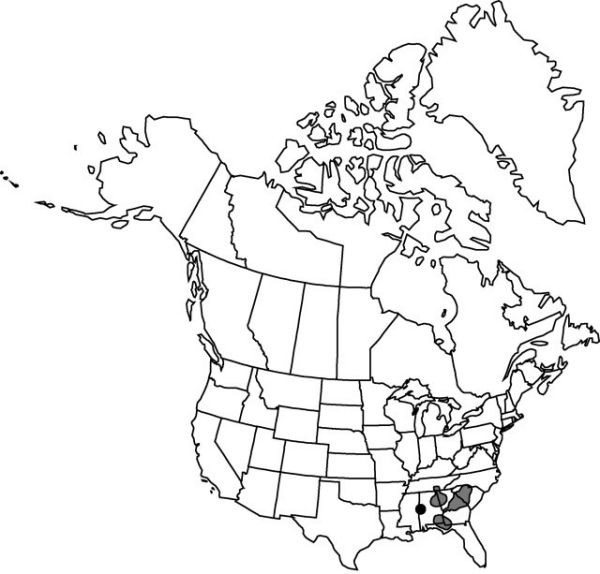Difference between revisions of "Trillium lancifolium"
Autik. Bot., 132. 1840.
FNA>Volume Importer |
imported>Volume Importer |
||
| (6 intermediate revisions by 2 users not shown) | |||
| Line 8: | Line 8: | ||
}} | }} | ||
|common_names=Lance-leaved trillium | |common_names=Lance-leaved trillium | ||
| + | |special_status={{Treatment/ID/Special_status | ||
| + | |code=E | ||
| + | |label=Endemic | ||
| + | }} | ||
|basionyms= | |basionyms= | ||
|synonyms= | |synonyms= | ||
| Line 24: | Line 28: | ||
|elevation=20–200 m | |elevation=20–200 m | ||
|distribution=Ala.;Fla.;Ga.;S.C.;Tenn. | |distribution=Ala.;Fla.;Ga.;S.C.;Tenn. | ||
| − | |discussion=<p>Trillium lancifolium occurs mostly in small, regionally disjunct populations.</p> | + | |discussion=<p><i>Trillium lancifolium</i> occurs mostly in small, regionally disjunct populations.</p> |
|tables= | |tables= | ||
|references= | |references= | ||
| Line 33: | Line 37: | ||
-->{{#Taxon: | -->{{#Taxon: | ||
name=Trillium lancifolium | name=Trillium lancifolium | ||
| − | |||
|authority=Rafinesque | |authority=Rafinesque | ||
|rank=species | |rank=species | ||
| Line 47: | Line 50: | ||
|publication title=Autik. Bot., | |publication title=Autik. Bot., | ||
|publication year=1840 | |publication year=1840 | ||
| − | |special status= | + | |special status=Endemic |
| − | |source xml=https:// | + | |source xml=https://bitbucket.org/aafc-mbb/fna-data-curation/src/2e0870ddd59836b60bcf96646a41e87ea5a5943a/coarse_grained_fna_xml/V26/V26_131.xml |
|genus=Trillium | |genus=Trillium | ||
|subgenus=Trillium subg. Phyllantherum | |subgenus=Trillium subg. Phyllantherum | ||
Latest revision as of 21:13, 5 November 2020
Rhizome horizontal, white, very slender-elongated, brittle; internodes elongated. Scapes 1–2, round in cross section, 1.5–3.2 dm, ca. 2.5–3 times longer than bracts, slender, glabrous. Bracts often downturned but leaves held well away from ground, sessile; blade mottled darker green, mottling becoming obscure in age, lanceolate to narrowly lanceolate-elliptic, 5–8.3 × 2–3.3 cm, not glossy, apex blunt or acute. Flower erect, no odor reported; sepals recurved basally and declining to ± same plane of and alternating with leaves, green, lanceolate, 13–20 × 5–7 mm, margins entire, apex acute; petals long-lasting, erect, ± connivent, not fully concealing stamens and ovary, maroon-red, purple, greenish tan, or 2-colored, claw dark reddish maroon basally, often twisted, linear to narrowly spatulate, 2.8–6.6 × 20–40 cm, widest above middle, thick-textured, basally clawed, margins entire, apex acute, claw to ± 1/2 as long as expanded limb; stamens incurved, 13–21 mm; filaments purple, slender; anthers weakly to strongly incurved, purple, 4–6 mm, ± slender, dehiscence introrse; connectives weakly to strongly incurved, purple, extending 1 mm beyond anthers; ovary dark purple, ovoid-rhomboid, 6-angled, 6–7 mm; stigmas erect, somewhat divergent-recurved, distinct, purple, nearly linear, obscurely subulate, 3–4 mm, weakly fleshy. Fruits baccate, purplish, odorless, 6-angled, prolonged angle folds making fruit appear almost winged, 0.7–1.2 cm, pulpy. 2n = 10.
Phenology: Flowering later winter–spring (Feb–early May).
Habitat: Alluvial soils, floodplains, rocky upland woodlands, brushy thickets, canebrakes, heavy shade, or thin, open woods
Elevation: 20–200 m
Distribution

Ala., Fla., Ga., S.C., Tenn.
Discussion
Trillium lancifolium occurs mostly in small, regionally disjunct populations.
Selected References
None.